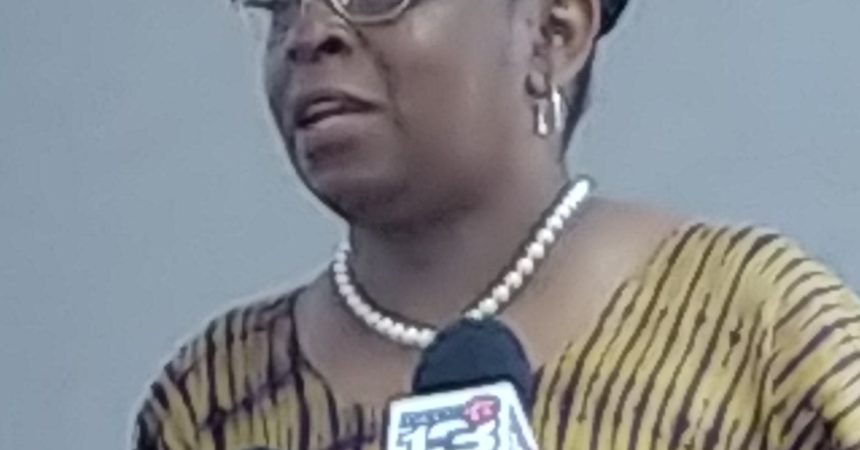Call for citizen review board to monitor TPD has long history
Supporters of a proposal to create more oversight of law enforcement behavior in Tallahassee are hoping that it will come to fruition after several futile attempts during the last decade.
The idea of having a citizen review board to analyze how police-involved cases are handled got a boost last Wednesday when the City Commission unanimously approved plans to move forward on pursuing how to bring a board together.
Both local chapters of the Urban League and the NAACP have given their support to the idea. Pressure to form the oversight board has been building since protesters first took to the streets two weeks ago over police-involved killing of Black people.
Leon County Sheriff Walt McNeil and Lawrence Revell, chief of Tallahassee Police Department, have also expressed support for having a review board.

TPD Chief Lawrence Revell participated in a meet-and-greet before he was selected to head up the agency.
Photo by St. Clair Murraine
“That review of the process by the citizens is a good thing,” McNeil said. “In fact, I’ve said over and over again that citizens should be engaged in reviewing and looking at what we do as law enforcement agencies, but they can’t supersede that state law.”
The idea of forming a citizen’s review board came up during a segment in the city commission meeting where Revell was scheduled to give an update on law enforcement. Explaining that she has been doing research on how to effectively form a review board, Commissioner Dianne Williams-Cox said the board would oversee both the Sheriff and TPD.
Williams-Cox also acknowledged that getting a board that has authority will require legislation. That part of the process, which state statutes require, didn’t go anywhere in previous attempt to form a review board.
However, city attorney Cassandra Jackson noted that several cities around the state has various types of law enforcement oversight boards.

City Commissioner Dianne Williams-Cox made the case for a citizen review board at last week’s commission meeting.
Photo by St. Clair Murraine
Revell said the review board will be a good idea, but he expressed concern that it might be duplicating the efforts of a citizen’s advisory committee. He has been pushing the formation of the committee since taking office earlier this year.
“That group will have access to everything we do,” Revell told the commission during its virtual meeting. “The purpose of that group is to provide oversight; they will look at our policies, procedures (and) the things we do and make recommendations to us and back to the community to help improve what we do.”
Deputy Chief Tonja Bryant-Smith, who is overseeing organization of the committee, said members will be required to attending police training and would also be able to do ride-along with officers. Rudy Ferguson, pastor at New Birth Tabernacle, was appointed to head up the committee. While members of a review board also will be required to take the same training, it would be independent of TPD or the sheriff, according to what’s being proposed.
At least 86 people have expressed interest in being on the committee, said Bryant-Smith. Its first meeting is expected to take place in July, she said.
The call for a review board is being revisited following three recent police-involved shootings in the city. The most recent case in which Latosha “Tony” McDade was shot by a TPD officer, came just three days after former Minneapolis police officer Derek Chauvin kneeled on George Floyd’s neck until he died.
Ironically, Minneapolis has a police review board that has been criticized for being ineffective. But Curtis Taylor, president of the local chapter of the Urban League, said a law enforcement oversight board could work in Tallahassee.
“This will help to get us to the point where everybody is comfortable with where we are going,” Taylor said.
Taylor said he is optimistic that civil rights changes will come because of Floyd’s death, pointing to civil rights changes that occurred after the 1955 lynching of Emmett Till, a Black teenager in Mississippi.
“The same thing we did with Emmet Till as a civil rights icon, we have to do with Brother Floyd,” Taylor said. “When you look across this country with all of the marches and all of the protests; even internationally, it becomes so powerful.”
Floyd’s death set off world-wide protest, while protesters in Tallahassee also did so in calling for answers about the McDade case and other police-involved shootings.
A review board would not be able to provide answers while a case is being investigates, but it could look into it after the evidence is presented. Members of the board would be selected by the commission, Williams-Cox said.
“It won’t help with what’s going on right now but we could begin anew and have something in place so that in the future if something like this happens, heaven forbids, we’ll have a place where citizens could be a part of what happened,” Williams-Cox said.
Both Revell and McNeil acknowledged that previous attempts have been made to form a law enforcement review board. However, it couldn’t get necessary legislative support and failed.
Meanwhile, at least the last five presidents of the NAACP, including himself, have asked for the review board, said current president Adner Marcelin.
What’s needed is a board that has “power, teeth, the ability to discipline officers and more importantly to review when there is an officer-involved shooting and just the general conduct of our police officers,” Marcelin said.
He said that with the police-involved shooting cases being a White officer shooting a Black person, racism is at the core of what’s transpiring today.
“What you’re seeing is a demand for greater accountability from our law enforcement officials,” Marcelin said. “As the NAACP, we always stand on the side of transparency and we will always stand on the side of accountability.”
At the height of the protests a week ago, McNeil and Revell met with some of the organizers. They presented a list of demands that include an app in conjunction with an officer’s body cam. The commission also presented details about establishing an app and discussed how it could possibly have an automated function that would kick on and record accounts of an incident involving a police officer.
The group was represented by attorney Mataki Akbar, who said the commission has taken a good first step on forming a review board.
“It is a step in the right direction,” he said. “Looking at that review board and trying to make that happen, I think it is important. Also, to have the discussion about the app.”
Three days after the City Commission unanimously agreed to form a review board, McDade’s funeral was held in Tallahassee. McDade, a suspect in the stabbing death of Malik Jackson, was shot by a TPD officer who responded to a call about the stabbing.
Jackson’s funeral was also held last Saturday, when protesters marched outside TPD headquarters, calling for Revell’s resignation. They also called for de-escalation of TPD officers, which was in an online petition being circulated by Faith Life Church.
Protesters also called for release of the name of the officer who shot McDade. Protesters also want the name of the officer who shot Mychael Johnson, who was killed in another police-involved shooting last month.
The city had plans to release the name on the officer in the McDade case Monday, but that hit a snag when several TPD officers walked out of a meeting on the issue last weekend. However, the city is expected to release the name this week unless it’s delayed by a motion it that the Florida Police Benevolent Association planned to file in an effort to use the state’s Marsy’s Law to protect his identity.
Even if protesters get the name of the officer, Akbar said a lot more will have to be done to mend the relationship between Blacks and police.
“We’re still going to have to address what has been systemic for a long, long time,” Akbar said.









